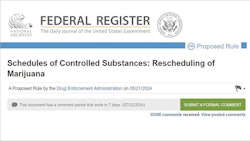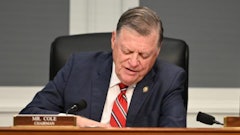
State regulators, advocates, health experts and patients were among a surge of parties to submit comments July 22 to the Drug Enforcement Administration (DEA) on a proposed rule to reschedule marijuana in what may have been a strategic move for some.
While July 22 marked the end of a 60-day public comment period from when the DEA published the notice of proposed rulemaking—to reclassify cannabis from a Schedule I to Schedule III drug under the Controlled Substances Act (CSA)—on May 21 in the Federal Register, the DEA continued to post comments July 23 on the Federal Register’s website that had met the deadline.
As of 1 p.m. ET on July 23, nearly 43,000 commenters submitted their input, including almost 7,500 (17.5%) in the final three days. The DEA posted more than 3,000 comments the day after the 60-day period closed (those filed the day before).
“I have seen the first-hand effects of medical cannabis for improving quality of life. I experienced severe neuropathy in my feet, making walking very difficult, that medical cannabis helped. This type of care should be available for everybody,” wrote Ruth Feister, one of the final commenters to submit her input by 11:59 p.m. on July 22.
“It is life-saving to those with debilitating illnesses and improves the quality of life for millions of Americans managing chronic disease,” Feister wrote. “Plus, medical cannabis has a very good safety profile from over 30,000 global research studies. Cannabis should not be a Schedule I substance with lived experiences and scientific evidence showing its benefits.”
Although the proposed rule is to reschedule cannabis, 69% of comments supported descheduling cannabis entirely by removing it from the CSA altogether, according to an analysis conducted by the Drug Policy Alliance (DPA). This analysis aligns with a 2023 Gallup poll that found 70% of U.S. adults support legalizing cannabis.
The DPA analysis resulted in the following findings:
- 69.3%, or 29,750 of comments, support descheduling, decriminalizing, or legalizing marijuana at the federal level;
- 42.4%, or 18,207 comments, mention the need for federal marijuana reform to advance racial justice or social equity; and
- 24%, or 10,327 comments, were submitted through a public comment tool hosted by United for Marijuana Decriminalization (UMD), a coalition that DPA convenes. These comments were the result of months of grassroots outreach to communities that have been impacted by marijuana criminalization.
While a Schedule III classification would provide tax relief to cannabis businesses, among other potential benefits to the industry, it wouldn’t change federal criminalization.
“Participation in public comment processes gives the American public a chance to speak from personal experience and provide feedback on proposed legal changes—and it gives the federal government an opportunity to adjust their proposals to reflect public opinion,” Cat Packer, Director of Drug Markets and Legal Regulation for the DPA, said in a public statement.
“When it comes to the DOJ’s proposal to reschedule marijuana, public opinion could not be clearer: 29,750 comments, nearly 70% of all comments, support federal decriminalization or legalization because rescheduling is simply not enough,” Packer said. “The people are demanding the Biden administration do more to deliver on the marijuana reforms that communities deserve—and that President Biden and Vice President Harris themselves have promised on numerous occasions.”
The Department of Justice (DOJ) officially issued the proposed rule that cannabis be rescheduled to Schedule III, with Attorney General Merrick Garland signing a 92-page notice in May. The DEA is a component of the DOJ but hasn’t necessarily endorsed the proposed rule.
“DEA has not yet made a determination as to its views of the appropriate schedule for marijuana,” according to the notice of proposed rulemaking published May 21 in the Federal Register.
While the DEA is the executive branch’s authoritative arm for rescheduling drugs under the CSA through a notice-and-comment rulemaking process, Washington lawmakers have questioned who’s calling the shots behind the scenes because Administrator Anne Milgram’s signature is absent on the 92-page notice—a document traditionally signed by the DEA administrator.
With the DEA long resisting cannabis rescheduling and with the May 21 Federal Register notice stating that the “DEA believes that additional information arising from this rulemaking will further inform the findings regarding the appropriate schedule for marijuana,” public participation soared during the 60-day comment period.
And the fact that roughly 17.5% of filers waited until the final three days, in part, was anticipated, according to Shane Pennington, a partner in the Litigation Department at Porter Wright who specializes in cannabis law and policy.
“I guarantee there will be more than 35K comments on this before it’s all said and done,” he wrote on social media July 16. “Most strategic filers will submit at the very last minute to prevent others from reading and responding.”
Pennington’s remarks came after Cannabis Business Times published an article on the roughly 30,000 comments that had been filed on the DEA’s proposed rule at that time. The article highlighted input from Dr. Peter Grinspoon, a well-known cannabis expert, U.S. Cannabis Council Executive Director Edward Conklin, and sample comments from cannabis advocacy organization NORML and prohibitionist group Smart Approaches to Marijuana that many filers repurposed or reused for their own submissions.
Michigan Cannabis Regulatory Agency Comments
Among the last-minute filers, the Michigan Cannabis Regulatory Agency (CRA) provided information and statistics about its state medical program to help the DEA “in its understanding of whether marijuana has currently accepted medical use.”
View the CRA’s public comment—submitted July 22—here.
The U.S. Health and Human Services Department (HHS), which recommended to the DEA in August 2023 that cannabis be relisted to Schedule III after conducting a scientific and medical evaluation for cannabis, determined that the plant does have “currently accepted medical use” in the U.S. and therefore does not belong among Schedule I drugs like heroin, LSD and ecstasy.
While HHS recommendations on scientific and medical matters are binding until the DEA issues a notice of proposed rulemaking, according to 21 U.S.C. § 811(b), the DEA has not publicly endorsed the “currently accepted medical use” standard for cannabis, a key finding that must be made for any drug to be removed from Schedule I.
“DEA has maintained an active review of the scientific literature addressing marijuana with a focus on how it relates to the scientific and medical evaluation and informs any updates to the eight-factor analysis,” according to the May 21 Federal Register notice.
The HHS released a 252-page document in January to shed light on its Schedule III recommendation and explain its medical and scientific determinations, which, according to the DEA, “must be accorded significant deference throughout the rulemaking process.”
“DEA believes that factual evidence (including scientific data) and expert opinions, including additional data regarding different forms, formulations and delivery methods for marijuana, as well as evidence regarding the effects of marijuana at various dosages or concentrations, may be relevant,” according to the May 21 notice of proposed rulemaking.
Michigan, which legalized medical cannabis in 2008, offers one lens.
Before Michigan legalized adult-use cannabis in 2018, the state’s medical cannabis program peaked at nearly 300,000 patients and more than 40,000 caregivers, according to the CRA. Michigan currently has 129,000 qualifying patients who utilize cannabis to treat 27 debilitating medical conditions, including chronic pain, arthritis, muscle spasms, post-traumatic stress disorder, severe nausea and cancer, according to the CRA.
Nationwide, the HHS confirmed that more than 30,000 health care practitioners across 43 U.S. jurisdictions recommend cannabis for more than 6 million registered patients.
In addition, the CRA provided the DEA with information on the following topics for consideration on how the administration should implement cannabis rescheduling:
- Requirements Applicable to Schedule III Drugs
- Banking and Taxation
- Bankruptcy Protection
- Packaging, Labeling, and Advertising
- Product Safety Standards
- Transportation and Interstate Commerce
- Research
- Federal Enforcement
- Federal Regulatory Agencies that will Oversee Activities Related to Marijuana
“As we stand at an important crossroads with the possibility of a federal rescheduling of marijuana, the CRA wanted to make it very clear in our public comment that rescheduling will do little good if the federal government fails to provide clear and robust whole-of-government guidance on the implications of the rescheduling,” CRA Executive Director Brian Hanna said in a public statement.
Massachusetts Cannabis Control Commission Comments
The Massachusetts Cannabis Control Commission (CCC), which submitted comments July 19, was among approximately 12,000 filers (28%) in the final seven days of the 60-day period.
The CCC commented in support of the HHS’ determination that cannabis has currently accepted medical use and provided the DEA input in three areas:
- Current and Future Medical Uses of Cannabis
- Regulatory Considerations of Rescheduling
- Political Considerations for Understanding New Classification
Massachusetts legalized medical cannabis in 2012 and adult-use cannabis in 2016, en route to becoming the first state east of the Mississippi to launch adult-use sales in 2018. There are now 38 states, Washington D.C., and four U.S. territories where medical cannabis is legalized without severely limited access to patients. Another 24 states have legalized adult-use cannabis.
“Rescheduling cannabis is a monumental step forward for the federal government, one that can open new avenues to research, medical use and banking for the regulated industries that states like Massachusetts have built across the country,” CCC Acting Chair Ava Callender Concepcion said in a July 22 press release.
As part of the CCC’s submitted comments, the commission also highlighted the need to prioritize equity, and it encouraged the DEA to implement regulatory changes to expunge criminal records for cannabis-related offenses.
“In order to realize the full potential of this industry, it will be essential that we safeguard our equity efforts and ensure that the positive impacts of this change are felt industrywide,” Concepcion said. “Massachusetts is a leader in this space, ready and willing to share our proven practices for regulating a safe, effective and equitable industry with our federal partners as rescheduling moves forward.”
CCC commissioners Nurys Camargo, Kimberly Roy and Bruce Stebbins also signed the commission’s comment filed with the DEA.
The Massachusetts regulators also called for training and resources tailored to health care providers, law enforcement, patients and caregivers, business owners and the general public “to ensure a thorough understanding of the rescheduling changes and their impacts.”
National Cannabis Roundtable Comments
The National Cannabis Roundtable (NCR) also submitted comments July 19 to the DEA in support of the proposed rule to reclassify cannabis.
The NCR is an alliance of cannabis companies, ancillary services and solutions providers seeking reform to further the U.S. cannabis industry, protect consumers and advance social equity. The organization’s public comment includes a 61-page document overviewing three key topics:
- Recent Findings Related to Abuse Potential to Support Schedule III Classification
- Research Opinion, Scientific Studies and Clinical Trials to Demonstrate a Currently Accepted Medical Use Consistent With Schedule III Classification
- Schedule III Classification Has Significant Positive Economic Impact
“Rescheduling cannabis to Schedule III is not just a logical step; it is a necessary one,” former HHS Secretary Kathleen Sebelius said in a July 22 press release. Sebelius is an honorary co-chair for the NCR.
“It reflects the evolving understanding and acceptance of cannabis in the United States and aligns federal policy with the realities of state-level legalization,” Sebelius said. “By adopting this evidence-based strategy, we can foster a better understanding of cannabis, its benefits, and its risks, ultimately leading to more informed policies and healthier communities. The comments prepared by NCR serve as a robust complement to the work that HHS and DOJ have already done on this effort supporting a conclusion of reclassifying cannabis to Schedule III.”
Comments Closed
Now that the 60-day public comment period has ended, the DOJ/DEA can finalize the rule. However, cannabis rescheduling opponents who challenge the rule can trigger administrative law hearings, which Milgram can select an administrative law judge to preside over under her authority as DEA administrator.
Interested parties must have requested a hearing or waiver of an opportunity for a hearing or to participate in a hearing before June 20, according to the proposed rule. These requests must provide a “written statement of position on the matters of fact and law involved in such hearing.”
“The decision whether an in-person hearing will be needed to address such matters of fact and law in the rulemaking will be made by the administrator of DEA,” according to the proposed rule and in accordance with the Code of Federal Regulations. “Upon the administrator’s determination to grant an in-person hearing, DEA will publish a notice of hearing on the proposed rulemaking in the Federal Register.”
CBT contacted the DOJ’s public affairs office requesting information on the number of hearings requested and/or scheduled, but it was not provided with details.


























